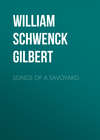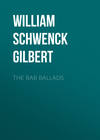Читать книгу: «More Bab Ballads», страница 6
Шрифт:
Ballad: The Perils Of Invisibility
OLD PETER led a wretched life—
Old PETER had a furious wife;
Old PETER too was truly stout,
He measured several yards about.
The little fairy PICKLEKIN
One summer afternoon looked in,
And said, “Old PETER, how de do?
Can I do anything for you?
“I have three gifts—the first will give
Unbounded riches while you live;
The second health where’er you be;
The third, invisibility.”
“O little fairy PICKLEKIN,”
Old PETER answered with a grin,
“To hesitate would be absurd,—
Undoubtedly I choose the third.”
“’Tis yours,” the fairy said; “be quite
Invisible to mortal sight
Whene’er you please. Remember me
Most kindly, pray, to MRS. P.”
Old MRS. PETER overheard
Wee PICKLEKIN’S concluding word,
And, jealous of her girlhood’s choice,
Said, “That was some young woman’s voice:
Old PETER let her scold and swear—
Old PETER, bless him, didn’t care.
“My dear, your rage is wasted quite—
Observe, I disappear from sight!”
A well-bred fairy (so I’ve heard)
Is always faithful to her word:
Old PETER vanished like a shot,
Put then—his suit of clothes did not!
For when conferred the fairy slim
Invisibility on him,
She popped away on fairy wings,
Without referring to his “things.”
So there remained a coat of blue,
A vest and double eyeglass too,
His tail, his shoes, his socks as well,
His pair of—no, I must not tell.
Old MRS. PETER soon began
To see the failure of his plan,
And then resolved (I quote the Bard)
To “hoist him with his own petard.”
Old PETER woke next day and dressed,
Put on his coat, and shoes, and vest,
His shirt and stock; but could not find
His only pair of—never mind!
Old PETER was a decent man,
And though he twigged his lady’s plan,
Yet, hearing her approaching, he
Resumed invisibility.
“Dear MRS. P., my only joy,”
Exclaimed the horrified old boy,
“Now, give them up, I beg of you—
You know what I’m referring to!”
But no; the cross old lady swore
She’d keep his—what I said before—
To make him publicly absurd;
And MRS. PETER kept her word.
The poor old fellow had no rest;
His coat, his stick, his shoes, his vest,
Were all that now met mortal eye—
The rest, invisibility!
“Now, madam, give them up, I beg—
I’ve had rheumatics in my leg;
Besides, until you do, it’s plain
I cannot come to sight again!
“For though some mirth it might afford
To see my clothes without their lord,
Yet there would rise indignant oaths
If he were seen without his clothes!”
But no; resolved to have her quiz,
The lady held her own—and his—
And PETER left his humble cot
To find a pair of—you know what.
But—here’s the worst of the affair—
Whene’er he came across a pair
Already placed for him to don,
He was too stout to get them on!
So he resolved at once to train,
And walked and walked with all his main;
For years he paced this mortal earth,
To bring himself to decent girth.
At night, when all around is still,
You’ll find him pounding up a hill;
And shrieking peasants whom he meets,
Fall down in terror on the peats!
Old PETER walks through wind and rain,
Resolved to train, and train, and train,
Until he weighs twelve stone’ or so—
And when he does, I’ll let you know.
Ballad: Old Paul And Old Tim
When rival adorers come courting a maid,
There’s something or other may often be said,
Why he should be pitched upon rather than him.
This wasn’t the case with Old PAUL and Old TIM.
No soul could discover a reason at all
For marrying TIMOTHY rather than PAUL;
Though all could have offered good reasons, on oath,
Against marrying either—or marrying both.
They were equally wealthy and equally old,
They were equally timid and equally bold;
They were equally tall as they stood in their shoes—
Between them, in fact, there was nothing to choose.
Had I been young EMILY, I should have said,
“You’re both much too old for a pretty young maid,
Threescore at the least you are verging upon”;
But I wasn’t young EMILY. Let us get on.
No coward’s blood ran in young EMILY’S veins,
Her martial old father loved bloody campaigns;
At the rumours of battles all over the globe
He pricked up his ears like the war-horse in “Job.”
He chuckled to hear of a sudden surprise—
Of soldiers, compelled, through an enemy’s spies,
Without any knapsacks or shakos to flee—
For an eminent army-contractor was he.
So when her two lovers, whose patience was tried,
Implored her between them at once to decide,
She told them she’d marry whichever might bring
Good proofs of his doing the pluckiest thing.
They both went away with a qualified joy:
That coward, Old PAUL, chose a very small boy,
And when no one was looking, in spite of his fears,
He set to work boxing that little boy’s ears.
The little boy struggled and tugged at his hair,
But the lion was roused, and Old PAUL didn’t care;
He smacked him, and whacked him, and boxed him, and kicked
Till the poor little beggar was royally licked.
Old TIM knew a trick worth a dozen of that,
So he called for his stick and he called for his hat.
“I’ll cover myself with cheap glory—I’ll go
And wallop the Frenchmen who live in Soho!
“The German invader is ravaging France
With infantry rifle and cavalry lance,
And beautiful Paris is fighting her best
To shake herself free from her terrible guest.
“The Frenchmen in London, in craven alarms,
Have all run away from the summons to arms;
They haven’t the pluck of a pigeon—I’ll go
And wallop the Frenchmen who skulk in Soho!”
Old TIMOTHY tried it and found it succeed:
That day he caused many French noses to bleed;
Through foggy Soho he spread fear and dismay,
And Frenchmen all round him in agony lay.
He took care to abstain from employing his fist
On the old and the crippled, for they might resist;
A crippled old man may have pluck in his breast,
But the young and the strong ones are cowards confest.
Old TIM and Old PAUL, with the list of their foes,
Prostrated themselves at their EMILY’S toes:
“Oh, which of us two is the pluckier blade?”
And EMILY answered and EMILY said:
“Old TIM has thrashed runaway Frenchmen in scores,
Who ought to be guarding their cities and shores;
Old PAUL has made little chaps’ noses to bleed—
Old PAUL has accomplished the pluckier deed!”
Ballad: The Mystic Selvagee
Perhaps already you may know
SIR BLENNERHASSET PORTICO?
A Captain in the Navy, he—
A Baronet and K.C.B.
You do? I thought so!
It was that Captain’s favourite whim
(A notion not confined to him)
That RODNEY was the greatest tar
Who ever wielded capstan-bar.
He had been taught so.
“BENBOW! CORNWALLIS! HOOD!—Belay!
Compared with RODNEY”—he would say—
“No other tar is worth a rap!
The great LORD RODNEY was the chap
The French to polish!
“Though, mind you, I respect LORD HOOD;
CORNWALLIS, too, was rather good;
BENBOW could enemies repel,
LORD NELSON, too, was pretty well—
That is, tol-lol-ish!”
SIR BLENNERHASSET spent his days
In learning RODNEY’S little ways,
And closely imitated, too,
His mode of talking to his crew—
His port and paces.
An ancient tar he tried to catch
Who’d served in RODNEY’S famous batch;
But since his time long years have fled,
And RODNEY’S tars are mostly dead:
Eheu fugaces!
But after searching near and far,
At last he found an ancient tar
Who served with RODNEY and his crew
Against the French in ’Eighty-two,
(That gained the peerage).
He gave him fifty pounds a year,
His rum, his baccy, and his beer;
And had a comfortable den
Rigged up in what, by merchantmen,
Is called the steerage.
“Now, JASPER”—’t was that sailor’s name—
“Don’t fear that you’ll incur my blame
By saying, when it seems to you,
That there is anything I do
That RODNEY wouldn’t.”
The ancient sailor turned his quid,
Prepared to do as he was bid:
“Ay, ay, yer honour; to begin,
You’ve done away with ‘swifting in’—
Well, sir, you shouldn’t!
“Upon your spars I see you’ve clapped
Peak halliard blocks, all iron-capped.
I would not christen that a crime,
But ’twas not done in RODNEY’S time.
It looks half-witted!
Upon your maintop-stay, I see,
You always clap a selvagee!
Your stays, I see, are equalized—
No vessel, such as RODNEY prized,
Would thus be fitted!
“And RODNEY, honoured sir, would grin
To see you turning deadeyes in,
Not up, as in the ancient way,
But downwards, like a cutter’s stay—
You didn’t oughter;
Besides, in seizing shrouds on board,
Breast backstays you have quite ignored;
Great RODNEY kept unto the last
Breast backstays on topgallant mast—
They make it tauter.”
SIR BLENNERHASSET “swifted in,”
Turned deadeyes up, and lent a fin
To strip (as told by JASPER KNOX)
The iron capping from his blocks,
Where there was any.
SIR BLENNERHASSET does away,
With selvagees from maintop-stay;
And though it makes his sailors stare,
He rigs breast backstays everywhere—
In fact, too many.
One morning, when the saucy craft
Lay calmed, old JASPER toddled aft.
“My mind misgives me, sir, that we
Were wrong about that selvagee—
I should restore it.”
“Good,” said the Captain, and that day
Restored it to the maintop-stay.
Well-practised sailors often make
A much more serious mistake,
And then ignore it.
Next day old JASPER came once more:
“I think, sir, I was right before.”
Well, up the mast the sailors skipped,
The selvagee was soon unshipped,
And all were merry.
Again a day, and JASPER came:
“I p’r’aps deserve your honour’s blame,
I can’t make up my mind,” said he,
“About that cursed selvagee—
It’s foolish—very.
“On Monday night I could have sworn
That maintop-stay it should adorn,
On Tuesday morning I could swear
That selvagee should not be there.
The knot’s a rasper!”
“Oh, you be hanged,” said CAPTAIN P.,
“Here, go ashore at Caribbee.
Get out—good bye—shove off—all right!”
Old JASPER soon was out of sight—
Farewell, old JASPER!
Ballad: The Cunning Woman
On all Arcadia’s sunny plain,
On all Arcadia’s hill,
None were so blithe as BILL and JANE,
So blithe as JANE and BILL.
No social earthquake e’er occurred
To rack their common mind:
To them a Panic was a word—
A Crisis, empty wind.
No Stock Exchange disturbed the lad
With overwhelming shocks—
BILL ploughed with all the shares he had,
JANE planted all her stocks.
And learn in what a simple way
Their pleasures they enhanced—
JANE danced like any lamb all day,
BILL piped as well as danced.
Surrounded by a twittling crew,
Of linnet, lark, and thrush,
BILL treated his young lady to
This sentimental gush:
“Oh, JANE, how true I am to you!
How true you are to me!
And how we woo, and how we coo!
So fond a pair are we!
“To think, dear JANE, that anyways.
Your chiefest end and aim
Is, one of these fine summer days,
To bear my humble name!”
Quoth JANE, “Well, as you put the case,
I’m true enough, no doubt,
But then, you see, in this here place
There’s none to cut you out.
“But, oh! if anybody came—
A Lord or any such—
I do not think your humble name
Would fascinate me much.
“For though your mates, you often boast.
You distance out-and-out;
Still, in the abstract, you’re a most
Uncompromising lout!”
Poor BILL, he gave a heavy sigh,
He tried in vain to speak—
A fat tear started to each eye
And coursed adown each cheek.
For, oh! right well in truth he knew
That very self-same day,
The LORD DE JACOB PILLALOO
Was coming there to stay!
The LORD DE JACOB PILLALOO
All proper maidens shun—
He loves all women, it is true,
But never marries one.
Now JANE, with all her mad self-will,
Was no coquette—oh no!
She really loved her faithful BILL,
And thus she tuned her woe:
“Oh, willow, willow, o’er the lea!
And willow once again!
The Peer will fall in love with me!
Why wasn’t I made plain?”
* * * * *
A cunning woman lived hard by,
A sorceressing dame,
MACCATACOMB DE SALMON-EYE
Was her uncommon name.
To her good JANE, with kindly yearn
For BILL’S increasing pain,
Repaired in secrecy to learn
How best to make her plain.
“Oh, JANE,” the worthy woman said,
“This mystic phial keep,
And rub its liquor in your head
Before you go to sleep.
“When you awake next day, I trow,
You’ll look in form and hue
To others just as you do now—
But not to PILLALOO!
“When you approach him, you will find
He’ll think you coarse—unkempt—
And rudely bid you get behind,
With undisguised contempt.”
The LORD DE PILLALOO arrived
With his expensive train,
And when in state serenely hived,
He sent for BILL and JANE.
“Oh, spare her, LORD OF PILLALOO!
(Said BILL) if wed you be,
There’s anything I’d rather do
Than flirt with LADY P.”
The Lord he gazed in Jenny’s eyes,
He looked her through and through:
The cunning woman’s prophecies
Were clearly coming true.
LORD PILLALOO, the Rustic’s Bane
(Bad person he, and proud),
He laughed Ha! ha! at pretty JANE,
And sneered at her aloud!
He bade her get behind him then,
And seek her mother’s stye—
Yet to her native countrymen
She was as fair as aye!
MACCATACOMB, continue green!
Grow, SALMON-EYE, in might,
Except for you, there might have been
The deuce’s own delight
Ballad: Phrenology
“Come, collar this bad man—
Around the throat he knotted me
Till I to choke began—
In point of fact, garotted me!”
So spake SIR HERBERT WRITE
To JAMES, Policeman Thirty-two—
All ruffled with his fight
SIR HERBERT was, and dirty too.
Policeman nothing said
(Though he had much to say on it),
But from the bad man’s head
He took the cap that lay on it.
“No, great SIR HERBERT WHITE—
Impossible to take him up.
This man is honest quite—
Wherever did you rake him up?
“For Burglars, Thieves, and Co.,
Indeed, I’m no apologist,
But I, some years ago,
Assisted a Phrenologist.
“Observe his various bumps,
His head as I uncover it:
His morals lie in lumps
All round about and over it.”
“Now take him,” said SIR WHITE,
“Or you will soon be rueing it;
Bless me! I must be right,—
I caught the fellow doing it!”
Policeman calmly smiled,
“Indeed you are mistaken, sir,
You’re agitated—riled—
And very badly shaken, sir.
“Sit down, and I’ll explain
My system of Phrenology,
A second, please, remain”—
(A second is horology).
Policeman left his beat—
(The Bart., no longer furious,
Sat down upon a seat,
Observing, “This is curious!”)
“Oh, surely, here are signs
Should soften your rigidity:
This gentleman combines
Politeness with timidity.
“Of Shyness here’s a lump—
A hole for Animosity—
And like my fist his bump
Of Impecuniosity.
“Just here the bump appears
Of Innocent Hilarity,
And just behind his ears
Are Faith, and Hope, and Charity.
He of true Christian ways
As bright example sent us is—
This maxim he obeys,
‘Sorte tuâ contentus sis.’
“There, let him go his ways,
He needs no stern admonishing.”
The Bart., in blank amaze,
Exclaimed, “This is astonishing!
“I must have made a mull,
This matter I’ve been blind in it:
Examine, please, my skull,
And tell me what you find in it.”
That Crusher looked, and said,
With unimpaired urbanity,
“SIR HERBERT, you’ve a head
That teems with inhumanity.
“Here’s Murder, Envy, Strife
(Propensity to kill any),
And Lies as large as life,
And heaps of Social Villany.
“Here’s Love of Bran-New Clothes,
Embezzling—Arson—Deism—
A taste for Slang and Oaths,
And Fraudulent Trusteeism.
“Here’s Love of Groundless Charge—
Here’s Malice, too, and Trickery,
Unusually large
Your bump of Pocket-Pickery—”
“Stop!” said the Bart., “my cup
Is full—I’m worse than him in all;
Policeman, take me up—
No doubt I am some criminal!”
That Pleeceman’s scorn grew large
(Phrenology had nettled it),
He took that Bart. in charge—
I don’t know how they settled it.
Ballad: The Fairy Curate
Once a fairy
Light and airy
Married with a mortal;
Men, however,
Never, never
Pass the fairy portal.
Slyly stealing,
She to Ealing
Made a daily journey;
There she found him,
Clients round him
(He was an attorney).
Long they tarried,
Then they married.
When the ceremony
Once was ended,
Off they wended
On their moon of honey.
Twelvemonth, maybe,
Saw a baby
(Friends performed an orgie).
Much they prized him,
And baptized him
By the name of GEORGIE,
GEORGIE grew up;
Then he flew up
To his fairy mother.
Happy meeting—
Pleasant greeting—
Kissing one another.
“Choose a calling
Most enthralling,
I sincerely urge ye.”
“Mother,” said he
(Rev’rence made he),
“I would join the clergy.
“Give permission
In addition—
Pa will let me do it:
There’s a living
In his giving—
He’ll appoint me to it.
Dreams of coff’ring,
Easter off’ring,
Tithe and rent and pew-rate,
So inflame me
(Do not blame me),
That I’ll be a curate.”
She, with pleasure,
Said, “My treasure,
’T is my wish precisely.
Do your duty,
There’s a beauty;
You have chosen wisely.
Tell your father
I would rather
As a churchman rank you.
You, in clover,
I’ll watch over.”
GEORGIE said, “Oh, thank you!”
GEORGIE scudded,
Went and studied,
Made all preparations,
And with credit
(Though he said it)
Passed examinations.
(Do not quarrel
With him, moral,
Scrupulous digestions—
’Twas his mother,
And no other,
Answered all the questions.)
Time proceeded;
Little needed
GEORGIE admonition:
He, elated,
Vindicated
Clergyman’s position.
People round him
Always found him
Plain and unpretending;
Kindly teaching,
Plainly preaching,
All his money lending.
So the fairy,
Wise and wary,
Felt no sorrow rising—
No occasion
For persuasion,
Warning, or advising.
He, resuming
Fairy pluming
(That’s not English, is it?)
Oft would fly up,
To the sky up,
Pay mamma a visit.
* * * * * * * *
Time progressing,
GEORGIE’S blessing
Grew more Ritualistic—
Popish scandals,
Tonsures—sandals—
Genuflections mystic;
Gushing meetings—
Bosom-beatings—
Heavenly ecstatics—
Broidered spencers—
Copes and censers—
Rochets and dalmatics.
This quandary
Vexed the fairy—
Flew she down to Ealing.
“GEORGIE, stop it!
Pray you, drop it;
Hark to my appealing:
To this foolish
Papal rule-ish
Twaddle put an ending;
This a swerve is
From our Service
Plain and unpretending.”
He, replying,
Answered, sighing,
Hawing, hemming, humming,
“It’s a pity—
They’re so pritty;
Yet in mode becoming,
Mother tender,
I’ll surrender—
I’ll be unaffected—”
But his Bishop
Into his shop
Entered unexpected!
“Who is this, sir,—
Ballet miss, sir?”
Said the Bishop coldly.
“’T is my mother,
And no other,”
GEORGIE answered boldly.
“Go along, sir!
You are wrong, sir;
You have years in plenty,
While this hussy
(Gracious mussy!)
Isn’t two and twenty!”
(Fairies clever
Never, never
Grow in visage older;
And the fairy,
All unwary,
Leant upon his shoulder!)
Bishop grieved him,
Disbelieved him;
GEORGE the point grew warm on;
Changed religion,
Like a pigeon,12
And became a Mormon!
12.“Like a bird.”—Slang expression.
Жанры и теги
Возрастное ограничение:
0+Дата выхода на Литрес:
01 марта 2019Объем:
90 стр. 1 иллюстрацияПравообладатель:
Public Domain













